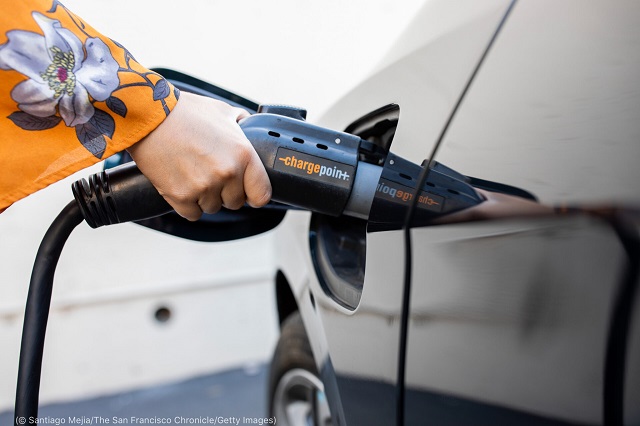On January 20, his first day in office, President Biden signed papers to bring the United States back into the Paris Agreement. On January 27, he issued an executive order deepening America’s commitment to combat the climate crisis.
“We can’t wait any longer,” Biden said before signing the order. “We see it with our own eyes, we feel it, we know it in our bones, and it’s time to act.”
The president stressed the need for international partnerships to meet the challenge.
“Domestic action must go hand in hand with United States international leadership, aimed at significantly enhancing global action,” Biden says in the order. “Together, we must listen to science and meet the moment.”

President Biden plans to replace the U.S. government’s fleet of automobiles with electric vehicles. (© Santiago Mejia/The San Francisco Chronicle/Getty Images)
In directing U.S. government agencies to work with international partners, Biden’s executive order:
- Starts a process for setting a U.S. emissions target under the Paris Agreement.
- Initiates development of a climate finance plan.
- Confirms that the president will host a Leaders’ Climate Summit on April 22, 2021.
At home, Biden’s executive order:
- Ensures federal infrastructure investment reduces climate pollution.
- Promotes ending fossil fuel subsidies and identifying new opportunities for innovation, commercialization and deployment of clean energy technologies and infrastructure.
- Pauses new oil and gas leasing on public lands and offshore waters, to the extent possible, pending a review of permitting processes.
- Establishes a goal of doubling offshore wind power by 2030.
- Develops a comprehensive federal clean electricity and zero-emission vehicle procurement strategy.
- Ensures every agency makes addressing climate change a top priority.
U.S. Special Presidential Envoy on Climate Change John Kerry summarized the sense of urgency.
“The stakes on climate change just simply couldn’t be any higher than they are right now,” Kerry told reporters on January 27. “The world will measure us by what we can do here at home.”
Banner image: President Biden is calling for doubling renewable energy production from offshore wind facilities like this one off Rhode Island by 2030. (© Michael Dwyer/AP Images)







COMMENTS0
LEAVE A COMMENT
TOP